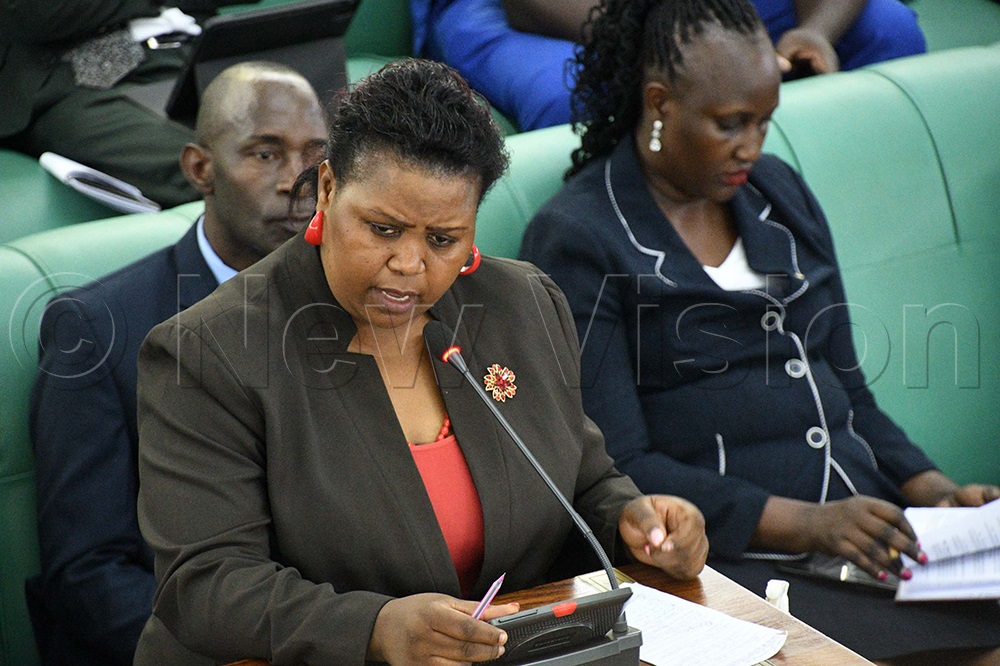Minister Anywar urges Ugandans to hydrate amid heat wave
According to Anywar, the current dry spell with high temperatures is expected to persist until mid-March after which cooling is anticipated with the onset of the rainy season.
State minister for environment, Beatrice Anywar. (Credit: Maria Wamala)
_______________________
For the past two months, Kampala has been sweltering under an average temperature of 27°C, leaving city dwellers restless.
Under the harsh weather, many struggle to sleep at night and others battle fatigue.
However, state minister for environment, Beatrice Anywar, responded by issuing a crucial advisory, urging Ugandans to stay hydrated to safeguard themselves against the relentless heatwave.
She echoed this during plenary on Wednesday, March 5, 2025. She was responding to concerns that Dr Samuel Opio Acuti (Kole North, NRM) had previously raised touching on the heatwave.
Legislators during plenary session. (Credit: Maria Wamala)
“Stay hydrated, drink plenty of water during the day, limit physical activities by avoiding excessive exercise during hot periods, stay indoors or in shade. This will reduce exposure to direct sunlight especially during the peak hours of the day. Take frequent showers, cooling down with bath showers regulates body temperatures. Plant more trees, increase vegetation cover in cities can also help reduce the urban heat,” Anywar advised.
“By following these precautions, individuals can minimize the effects of high temperatures and stay safe during the period. The general public is therefore advised to protect our wetlands and forests because they are essential in the rain formation and moderation of the climate,” she added.

Archbishop Samuel Stephen Kaziimba Mugalu and his entourage in the gallery after earlier conducting Ash Wednesday service At Parliament. (Credit: Maria Wamala)

7 Hills International School pupils in the gallery during the plenary session. (Credit: Maria Wamala)
Causes
According to her, the current dry spell with high temperatures is expected to persist until mid-March after which cooling is anticipated with the onset of the rainy season.
Anywar attributed the scorching temperatures to a mix of factors, including human-induced climate change and natural phenomena such as the sun’s movement.
“The tropical cyclones currently present over the southern Indian ocean is affecting Uganda’s weather. This cyclone is pulling moisture that would otherwise be carried by southernly winds into East Africa including Uganda. As a result, rainfall formation is suppressed, delaying the onset of the rain season,” she explained.
“During February the sun moves closer to the equator which runs through Uganda. It is directly overhead on the equator twice a year. On March 21, and September 23. As the sun approaches this position in February solar radiation increases leading to the high surface temperature,” Anywar added.
Fast forward, she explained that the reason why cities or towns are generally hotter is because of a combination of factors such as emission of greenhouse gases and prevalence of heat retaining surfaces like concrete and asphalt roads which later on release the heat into the atmosphere.

Deputy Speaker of Parliament, Thomas Tayebwa. (Credit: Maria Wamala)
Deputy Speaker Thomas Tayebwa limited debate to only Joseph Gonzaga Ssewungu (Kalungu West, NUP) who was the acting Leader of Opposition (LOP) and the committee chair on climate change due to time constraints.
“Whatever you add even the minister has gotten it from another department which is in charge of the environment. I will allow only two people. By the way, rule 52 says ‘it may be debated’. So, it is up to me and this is where I am basing myself. Now I have a bill which we must consider before we go. The bill on East African Treaty because we have not domesticated that treaty, I want us to sort it today before we leave and we have to break off at 5;00pm in order to join the catholic chaplaincy for prayers,” Tayebwa guided.

Legislators during plenary session. (Credit: Maria Wamala)

Ochai Maxmus, MP West Budama. (Credit: Maria Wamala)

7 Hills International School pupils in the gallery during the plenary session. (Credit: Maria Wamala)
On his part, Ssewungu watered down some of the minister's report narratives saying the position of the earth on the sun is a widely known fact and should not act as justification for the heat wave.
“What we need to address is the deforestation taking place in the country. Can we opt for other sources of energy other than cutting down trees? As we talk now, Ugandans have learnt to use gas but gas is very expensive. I see a number of vehicles still carrying charcoal and they are given room to move. Government must come out to create and reduce costs on all those available sources of energy that can save the environment,” he said.

Rose Obigah, Woman MP representing Terego District. (Credit: Maria Wamala)

Christine Kaaya Nakimwero, Kiboga Woman MP. (Credit: Maria Wamala)
Supplementing, Christine Kaaya Nakimwero (Kiboga Woman MP, NUP) emphasized the need to embrace agricultural mechanization, including cooling systems in animal husbandry, noting that certain livestock breeds, such as the white pig, may struggle to thrive in the current climate.
Nakimwero also called for measurable targets in the climate change fight. She was however guided by the Deputy Speaker to handle this at an opportune time when the respective sectoral committee will sit.